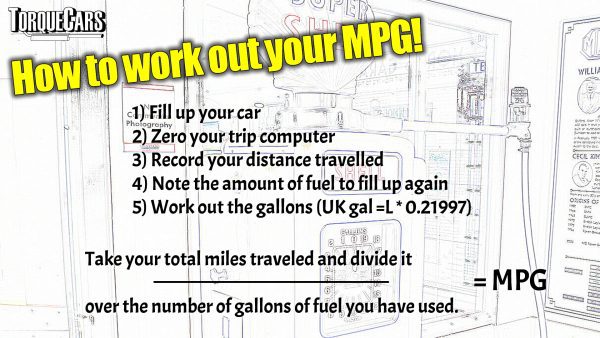Why you should care about your mpg
MPG tells you much about your car and your driving style. After you calculate your MPG ratings you can compare your MPG with the manufacturer's specifications and see how you fare.
If your MPG is much lower it could indicate a problem with the car which can be anything from a simple low tire pressure or something more mechanically at fault like a dirty fuel injector or faulty engine sensor.
Alternatively it could indicate a poor driving habit has developed. That heavy right foot, and heavy braking are extremely detrimental to your fuel economy.
A good MPG calculator should help you track your usage over time and make the comparison more easy.
So we will look at fuel economy and how to calculate your gas mileage in this article.
Does fuel efficiency change over time?
This surprises many people but there are differences between the seasons with cars consuming less fuel in the hot weather and more in winter.
Cold mornings mean higher energy consumption. What's the difference between warm summer days and hot weather?
Cold air carries more oxygen so it will require more fuel, and the plus side of this is that it gives you more power.
Also the wear and tear on your vehicle has a bearing on how efficiently it is working. Worn parts, faulty sensors and clogged filters and catallysts/dpfs can all cause problems when it comes to your fuel consumption.
Tire pressure as mentioned can be detrimental to your fuel economy and even dirty spark plugs or faulty ignition coils and leads or the wrong motor oil in your engine can reduce your fuel economy.
The condition of your oxygen sensor, the air filter condition and driving habits also have a bearing on your fuel economy.
So calculating fuel consumption should be viewed as an essential part of your driving life and will elp you keep your fuel costs down.
What is MPG?
MPG Miles per gallon is a measure of how much fuel your car uses. In different areas a different measure is used. GPL gallons permile, Liters per 100km are also standards used in some areas.
(miles per liter) refers to miles travelled per liter of fuel. MPG is also one of the key measures that determines the fuel efficiency of a vehicle.
Governments around the world regulate quoted MPG numbers for vehicles by assessing vehicle emissions according to lab test conditions in a specified set of circumstances.
Most regions will have a standard test to provide an official MPG figure, but interestingly these are always theoretical bests rather than a real world average consumption figure but they give an indication of your fuel costs.
They are a much better indication of real world MPG than they ever used to be.
MPG can vary because the vehicle is affected by various variables. In some cases traffic conditions can influence MPG with heavy stop start traffic majorly affecting your fuel consumption and idling in traffic is another big waste of fuel.
Why is Fuel Economy important
There are some many reasons why your fuel economy matters, from fuel and the affect this has on your pocket to the costs to the environment which is an area of growing concern for many people.
Without fuel efficiency standards and legislation you might argue that car manufacturers would only make gas guzzlers but fuel saving advancements have come on in leaps and bounds in recent years.
Free market advocates argue that fuel efficiency standards aren't necessary. If there is demand for fuel efficient vehicles, then automakers will create a supply to meet that demand.
While that sounds good in theory, in practice it doesn't happen and seems that automakers prove reluctant to offer fuel efficient options and will probably benefit from the increased wear and tear that comes from burning more fossil fuels.
Can you trust your cars display?
They are generally quite good, but tuning, especially piggyback tuning boxes can affect this as the car will be working to a set of false readings so the MPG shown will generally be much lower than it really is.
You might notice your fuel costs are soaring but the car is still showing a good MPG figure and doing this manual calculation let's you accurately work out the fuel consumed.
How to calculate your miles per gallon

The diagram above walks you through the manual way to calculate your car's MPG from Litres of fuel.
To calculate your MPG
- Reset your trip odometer computer when you fill up.
- Record your distance travelled
- Note the number of litres to fill up
- Multiply litres by 0.21997 to get Gallons (imperial)
- Take your total miles and divide it by the number of gallons
It really is that simple and we recommend you compare your calculated MPG with the offical mpg ratings provided by the manufacturer.
The really easy way is to use our MPG calculator and this will also track your last few fill ups for you.
See our YouTube Video about our MPG calculator.
Is 40mpg good?
It is reasonably good but depends on what you compare it to really, personally I would choose a car that does at least 45mpg because I drive many miles.
I've compiled a list of typical MPG figures so you can easily compare and see if you are above or below average.
Your annual fuel cost is quite important which we calculate in our app above for you if you enter a cost per litre.
Learn some Hypermiling Techniques
See our YouTube Hypermiling Video link for our top techniques for hypermiling and potentially double your fuel economy.
What fuel system is better
More recent advances in fuel systems mean that newer is more efficient than older technology.
Direct injection is generally more efficient than the older port fuel injection systems and the original carburetor setup is the least efficient of all fuel systems.
Hybrid cars take features from electric vehicles and these offer good fuel economy.
Much also depends on the cars mapping and the way it has been set up to burn the fuel in the first place.

6 Reasons for Decreases in Fuel Efficiency
Those who notice gas mileage drops are most likely to find one of the following problems and if you look at your dash you might even see the check engine light popping on.
- Mechanical engine problem
- Oxygen sensors malfunctioning
- Low Tyre pressures
- Clogged air filter
- Bad spark plugs
- Excess weight in the car
See our YouTube Video link based on economical driving techniques.
Fuel efficiency dropping? You might be the cause.
It's well known that sudden acceleration when lights turn green does no good to your car if fuel consumption is low but many drivers assume they are on a drag strip and race away as fast as possible, one of the biggest things that waste your gas mileage.
In fact, most daily habits impact car fuel use and this is something you the driver have the most control over.
Heavy throttle use and hard braking are typically the main drivers of high fuel consumption. Just braking less will generally add around 10% to your fuel economy and get you closer to the environmental protection agency figures.
Please Check out my YouTube channel, we're regularly adding new content...
PLEASE HELP: I NEED YOUR DONATIONS TO COVER THE COSTS OF RUNNING THIS SITE AND KEEP IT RUNNING. I do not charge you to access this website and it saves most TorqueCars readers $100's each year - but we are NON PROFIT and not even covering our costs. To keep us running PLEASE Donate here
If you liked this page please share it with your friends, drop a link to it in your favourite forum or use the bookmarking options to save it to your social media profile.
Feedback - What do You Think?
Please use our forums if you wish to ask a tuning question, and please note we do not sell parts or services, we are just an online magazine.
Help us improve, leave a suggestion or tip
Please watch this video and subscribe to my YouTube channel.

 Click to accept YouTube Cookies & Play.
Click to accept YouTube Cookies & Play.